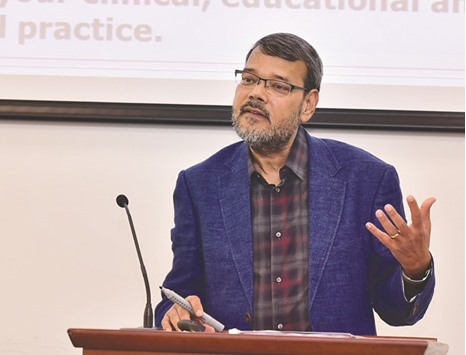Qatar University College of Medicine (QU-CMED) hosted a workshop aimed to present a contextual model of communication which can be mapped on to professional expertise in an integrated manner while considering the challenges of assessment in educational and training settings.
Themed “A Contextual Model of Healthcare Communication: Challenges for Description and Assessment”, the forum brought together healthcare professionals and researchers from several colleges within QU, Hamad Medical Corporation (HMC), and Weill Cornell Medicine-
Qatar (WCM-Q).
Attendees included QU vice president for Medical Education and CMED dean Dr Egon Toft, CMED associate dean for academic affairs Dr Hossam Hamdy, CMED head of Basic Medical Science Department Prof Marwan Farouk Abu-Hijleh, and HMC assistant medical director of Professional Development Dr Ameeta Patel, as well as CMED faculty, staff, and students.
The programme agenda included lectures delivered by Prof Srikant Sarangi, director of Danish Institute of Humanities and Medicine at Aalborg University, Denmark, on “An Overview of Concepts and Themes in Healthcare Communication” and “Analysing Healthcare Communication Data from a Contextual Perspective”.
Prof Sarangi noted the many challenges facing contemporary healthcare and which encompass globalisation and cultural diversity, bureaucratisation, ethical dilemmas, health technology and digitalisation, consumerism and the coming of age of the expert patient.
He stressed the need to reconfigure professional expertise, including communicative
expertise.
“Language/communication-based health care studies related to discourse have been carried out over the past four decades, both within quantitative and qualitative research paradigms.
“The conceptualisation of communication goes beyond the behavioural model of a skill-set to capture it as a dynamic system and environment, comprising content and relationship. By extension, the scope of communication teaching in health care curricula has to include not only doctor-patient encounter in the spoken form but also communication with and about patients in other modalities such as writing, inclusive of inter-professional and inter-organisational mediations.”
Prof Sarangi also noted that an adequate level of description of the multi-layered health care communication process is a necessary precondition for its assessment in the curricular setting and for its operationalisation in real-life professional practice.
The lecture was followed by a Q&A session featuring questions on issues related to the Qatari health care context, comparative discussions related to communication styles in various medical settings and cultures, and the influence of technological advancements and patient access to information on patient communication styles in the present and the future.

Prof Srikant Sarangi speaking at the workshop.
